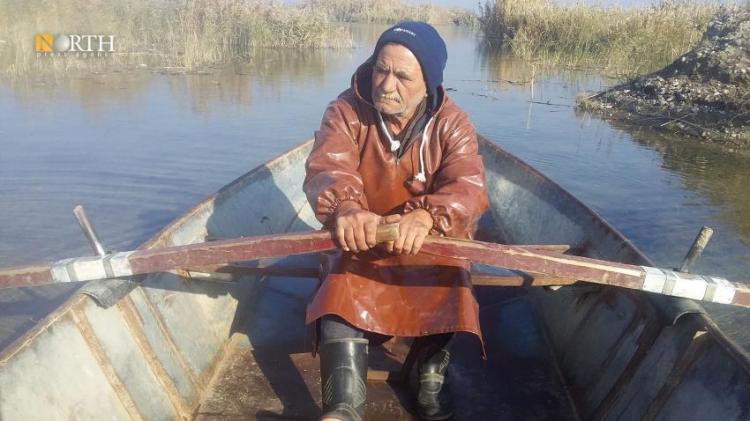Hawija on the Euphrates survived the war machine to enter years of chaos
Raqqa – North-Press Agency
Mustafa Khalil
A few hundred meters separate it from Raqqa, the city which was destroyed by the war in 2018 and turned it into rubble, where "Hawija al-Sawafi" is located on the right bank of the Euphrates, east of Old Raqqa Bridge, there is no little sign of the war, or the bombing of warplanes, or artillery shelling or bullets scratches on the walls. Local people of Hawija told to North-Press that it was covered with green, similar to the tropical savanna bush.
"The old man and the River"
Since the beginning of the war against the Islamic State organization (ISIS), which had taken Raqqa as its main stronghold and a capital to its so-called caliphate, the fisherman Yousef Habash moved to the jungles of Hawija al-Sawafi, to earn his living of fishing, in addition to his pension. Habash does not care about the rise or fall of the dollar’s exchange rate, nor does he complain about the continuity or lack of services like the rest of the people in Raqqa, as all he wants is the survival of the Euphrates as sparkling as it was before the war, since Habash considers everyone who passed through Raqqa is not innocent from neglecting the environment of the Euphrates, whether they are extremist or moderate Islamists, or other military forces.
After counting several types of fish that were present in the river, Habash attributed the reason for the disappearance of many types of fish, from the waters of the Euphrates River in general, and from Hawija al-Sawafi in particular, to the war as the sounds of heavy gunfire, and violent shelling caused the escape of the fish, "the fish are smart."
There are other direct reasons reported by Habash that led to the deterioration of fish resources in the Euphrates, such as overfishing methods like the use of dynamite and toxins, which are prohibited. As Those reasons also led to the disappearance of many types of animals and birds that used to live in Hawija in the past, including rabbit, fox, and wild cat (lynx), and birds, ducks and geese.
Lack of natural forest
Ms. Hayat Hamidi Al-Fawaz, from Hawija al-Sawafi, remembered how the village was at the beginning of settlement, she said: "In the early eighties of the last century the Euphrates River overflowed, and the water level rose, so the people crossed towards the left bank of the Euphrates as they feared for their lives."
Hayat described the natural Hawija trees before the start of the Syrian war, as many trees, dense, and that no one has cut or crushed them, same as happened after 2011, as some cut down even the trees planted in their houses in order to earn some money by selling firewood. While the agricultural engineer Hussein al-Jarjab, who is from Hawija al-Sawafi, considered that the village soil is suitable for cultivating all agricultural crops, and all types of fruitful trees because of its fertility and renewal, being directly on the bed of the Euphrates.
"Because of the encroachments of the people on the natural trees of Hawija, in addition to the economic factor and the use of these trees for heating instead of fuel," said al-Jarjab explaining the reasons of the deterioration of vegetation coverage.
Euphrates Floods
Hawija al-Sawafi and other villages near the Euphrates River continued to suffer from the damages caused by the floods which people could not control, except after the Syrian government built the Euphrates Dam in Tabqah, 54km west of the city of Raqqa, in the seventies of the last century. The peasants in Hawija, therefore, benefited from the expansion of the agricultural lands, according to the farmer Muhannad al-Fadil from Hawija al-Sawafi.
It is noteworthy that the discontinuation of Old Raqqa Bridge of service as a result of the bombing by the Global Coalition aircraft in its war against ISIS, in 2015, the village of Hawija al-Sawafi was transformed into a place through which the people of the southern countryside and al-Shamiya area in general crossed into the city of Raqqa, by small ferries, as it remained in this case until the Civil Council of Raqqa rehabilitated and restored the Old Raqqa Bridge in 2018.

